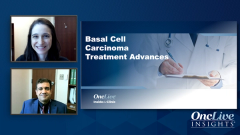
Referring Patients with Basal Cell Carcinoma to Medical Oncology
Dr. Shahab Babakoohi explains when to refer a patient with basal cell carcinoma from a dermatology practice to a medical oncologist.
Jennifer Atlas, MD: Which patients? We addressed this, but Dr Babakoohi, which patients do you see that you ultimately refer to medical oncology and at what point in their journey do you have that referral made?
Shahab Babakoohi, MD: It depends on the clinical features at presentation. There are some patients that need to be referred from get-go. For example, if you see a patient who presents with a large tumor on face, not treated for many years, keep growing, approaching close to the eye or other vital organs, in these patients from the first moment that dermatologist sees the patient realizes that this is not a typical scenario to do, for example, a surgery because of functional impairment or just figuring effects or surgery, or many times they send them to surgery as the standards of care. Then surgeon evaluates the patient, realizes that the surgery will need, for example, very large complex repair causing very adverse cosmetic or functional outcomes. In those cases, from the beginning, hopefully, they are sent to medical oncology for evaluation to see if there are other approaches in multidisciplinary team approach for treatment like consideration of radiation or systemic therapy. There are some patients that, as you mentioned, in the middle of the journey are transferred to medical oncology. These are patients who initially have standard of care, for example, surgery, but during surgery or frequently most micrographic surgery because these are high-risk patients, they realize that the tumor is more aggressive or advanced than was thought initially. For example, tumor has invasion. During surgical excision, they get close to the vital organs or maybe important areas like eyes or ears, and they see that the margins cannot become clear. With these features, they need to send the patient to oncology for consideration of systemic therapy because they know that surgery is not going to clear the disease completely.
Jennifer Atlas, MD: Certainly, from a medical oncology standpoint, I want to see as many patients who have high-risk features as early as possible in their journey to really weigh in not only on when the timing of systemic therapy might be of value but to help kind of in that multidisciplinary decision-making process. Do you find any challenges to bridging patients to medical oncology that you have found impact their care or outcome either from our institution or within the community?
Shahab Babakoohi, MD: In our institution, obviously not. Any patients who needs medical oncology attention, we have the blessing of having you here. We don't have that barrier here. To my knowledge on the referrals that we receive, in our institution there is no barrier for receiving those patients who need medical oncology consult. The most important factor is prompt attention on time action by the primary provider who sees the patient in community. The earlier referral before proceeding with possibly multiple procedures is preferable.
Jennifer Atlas, MD: From my perspective, certainly within academic institutions and as well in the community, it's all about setting the stage for a patient when they have high-risk disease. Setting that stage, it is scary sometimes to be sent to a cancer center or to be meeting medical oncology, surgical oncologist, or radiation oncologist setting that stage of we're going to have an interdisciplinary approach and team because you have high-risk disease early on, sets that stage for entry, for us to all have those various conversations. I find that once again, working in that multidisciplinary approach can really tell a patient and reassure them, hey, we have aggressive disease, but we have multiple different options for treatment and we're going to investigate what's best for you.
Transcript edited for clarity.





































